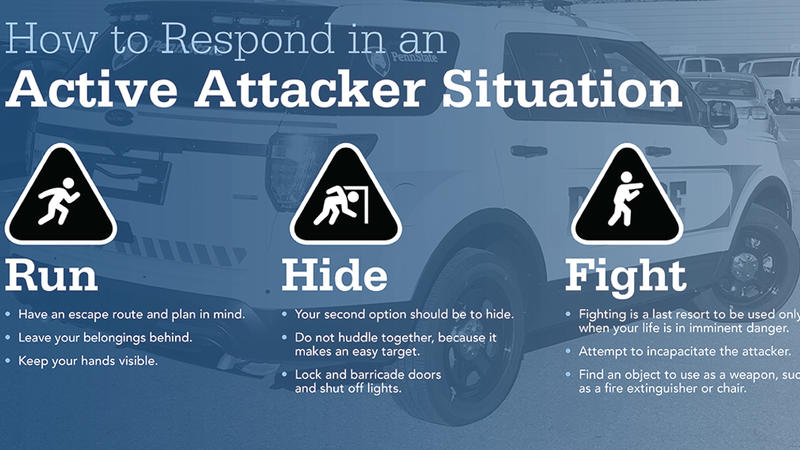Penn State Active Attacker Response Program

It is important to recognize the active attacks and threats that have dominated the headlines across college campuses and the country in recent years, and to recognize that violence can happen anywhere, including on our own campuses.
University Police and Public Safety (UPPS) urges the University's faculty, staff, students and visitors to familiarize themselves with Penn State's Active Attacker Response protocol based on the Run, Hide, Fight™ model. The model offers three steps if confronted with an active attacker - RUN if you can, HIDE if you can't, and FIGHT if needed.
RUN
- Make sure it is safe to leave the area.
- Use your senses (hearing, sight, etc.) to determine the safety of the situation.
- Leave calmly and in an orderly manner.
- Do not gather personal items.
HIDE
- Find an office, classroom, closet, desk, or other barrier within or behind which to hide.
- Stay quiet and silence your cell phone.
- Close and lock any doors. Turn off any lights.
- Barricade any doors by using furniture or other heavy items.
- Keep away from doorframes and windows.
- Try not to hide in groups.
- Prepare for your response if you are found by the active attacker. Consider what items may be used as weapons.
FIGHT
- Fight only when you are in a life-or-death situation or you could get hurt.
- Find objects that may be used as a weapon.
- Attempt to incapacitate the attacker; commit to your actions; work with others to disable the assailant.
Run, Hide, Fight™ is meant to provide options for response to a life-threatening attack and the guidance provided above is not all inclusive. Further, these options may not come in the order in which they are stated here. Educating yourself on the model and action options will help you determine your best plan of action.
The Run, Hide, Fight™ model is used with permission by the City of Houston, which developed the program using funding from the U.S. Department of Homeland Security. The program is endorsed at the local, state and federal levels, and by the U.S. Department of Homeland Security and the FBI. It is also the program adopted by the majority of Penn State’s Big Ten peers.
Faculty, Staff and Student Training
In the fall of 2024, UPPS introduced a new learning training course on the Learning Resource Network (LRN) and Canvas platforms, designed to provide faculty, staff and students with a comprehensive understanding of the Run, Hide, Fight model. The information provided will help guide you in the first steps of preparing yourself for the possibility of an active attack, which could be the key to your survival in such a situation.
In this training course, you will learn how to identify violent active attacker situations, the options you have in response to these situations (to run, hide, or fight), and what to expect from a police and University response. You will be provided with the tools you need to:
-
Empower Yourself: Gain confidence in your ability to handle unexpected situations.
-
Be Prepared: Learn practical tips and strategies that can be applied in various scenarios.
-
Enhance Campus Safety: Contribute to a safer campus environment by being informed and ready to act.
This course is required for all students at the University.
To access these training materials, please take the following steps:
Penn State Students:
Visit Canvas and search for the course title, “Active Attacker Response Program.”
Penn State Employees:
Visit the Learning Resource Network (LRN) website and search the course title “Active Attacker Response Program.”
Should you have any questions about the University’s Active Attack Response protocol, or if you would like to request an in-person training for your student organization, please reach out to University Police at (814) 863-1111 or visit UPPS’s Community Oriented Policing site.
ADDITIONAL RESOURCES
Run, Hide, Fight™ In-Person Trainings
University Police and Public Safety’s (UPPS) Community Oriented Policing Unit offers a variety of free Community Education Programs for faculty, staff and students on the topics of Penn State’s Active Attacker Response Program, Drug and Alcohol Awareness, Sexual Assault Awareness and Prevision, Pedestrian and Traffic Safety, Personal Safety and Awareness, and more. Any Penn State work unit or student group can learn more and request programs by visiting UPPS's Community Oriented Policing site.
Surviving an Active Attacker Training Video
As a warning, the video contains intense depictions of violence. It is designed in a realistic manner to educate the Penn State community on best practices for responding to a violent attack. However, it does not provide comprehensive guidelines for all scenarios and does not guarantee safety. Viewer discretion is advised.
For Emergencies, Call 911
